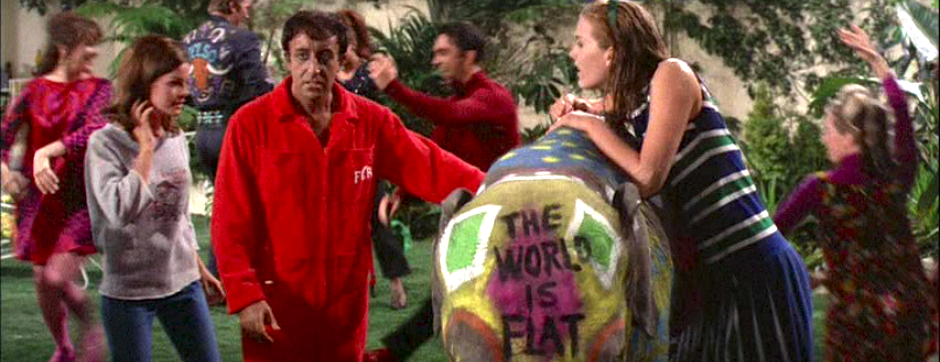
Image via Wikipedia
I am going to discuss here Pedro Almodóvar‘s opinion on piracy. Yes, piracy. And before everything else, I must say: Internet needs no regulation. Please don’t “regulate” the Internet.
First, I want to state that I absolutely and unconditionally love Almodóvar’s cinema. I consider him one of the film directors who have made (and continue doing so) the history of cinema. His latest movie, The Skin I Live In (La piel que habito) was precisely the subject of an interview with him (El abismo Almodóvar; The Almodóvar Abyss -English Translation by Google) that Ángel Harguindey published on El País of 21st August 2011. If you read the Google version please exchange “Abyss” for “Gap”.
Almodóvar expresses quite a marvelous set of ideas, here. His quotes of Hitchcock are remarkable, and I love them, but I am digressing. I really want to focus on this line:
All this [Internet] is wonderful, but there are aspects of the network that need regulation.
Almodóvar first talks about the unique and great virtues of the Internet, but states later that it needs “regulation“. He admits he understands that it would be very difficult to convince the youngsters to begin paying for something they take for granted can be had freely and instantly. And advances the idea of the moral rights of authors: the rights of having a movie shown as it was created by its director. He finishes off with the magic sentence:
For the film industry, the [illegal] downloads are a true cancer.
I need to discuss first the initial part of Almodóvar’s argument. Indeed it would be very difficult to convince people used to not paying that they suddenly have to begin spending money on their movies. Still, Steve Jobs disrupted the blind and arrogant music industry by doing exactly that. With the iTunes Store and the iPod, Apple convinced people to pay for the music they download. And they’re trying to do the same with movies. So far so good! Still, the film industry is not as easygoing as it portrays itself. Every time I try to legally view some episodes from AMC TV in Puerto Rico, for instance, I am told I cannot. Many times I try to view or download (and pay) movies from another country’s iTunes Store, I am told I cannot do that. Can you really blame me if sometime I just use a torrent to download the movie or episode and forget about the legalities of the matter? Why is it so extremely difficult, in this global world of ours to do so? I have no problem to pay for some movie I want to watch: thus please, let me!
However, this bring us to a compartmentalized world of artificial creation –markets divided and organized by the big industry– according to its own needs, which not always coincide with customers’. Also, with this lamentation, the film industry is crying much like its predecessor in demise, the music industry, which always refused –until compelled– to view reality under another perspective and to seek novel business models. The music industry is finally finding new models –with the help of the Internet– think Pandora or Spotify. The film industry will be compelled to do so, soon. It’s not my or anybody’s wish. It’s just the way things are. Either they develop a new business model or they are out of this world. What a pity if it were so, because, as Almodóvar says, this industry is home for many critical players, besides directors, actors and cinematographers.
Pedro Almodóvar certainly thinks in his brother’s words about illegal downloads, which place Spain as one of the countries with the highest number of movies obtained without paying. His brother estimates over 311,000 copies of the movie “Volver” were downloaded illegally from March 2006 to February 2007, 85% of which from within Spain. Agustín Almodóvar says some 1.6 million euros were so lost.
Thus, Almodóvar states “For the film industry, the [illegal] downloads are a true cancer.”
They may be: then what? I believe education and sensibility may help reduce that number. A cultural policy in towns everywhere may also help: Film Festivals, Films in schools, in public plazas, etc. may all be efforts to promote, more than protect, one country’s film industry. But they will not be enough. The film industry will ultimately need to change. How? Where? I have no idea. If there’s a solution, they ought to find it, or another Steve Jobs will find and impose it upon them. But I may suggest that the solution, if any at all exists, may well live in the newest Internet terrains, precisely the same they see so menacing today. Their nightmare will be new opportunities, I am convinced.
As for the “moral right” that an author has to have people watch a film exactly as the author wanted… well, it seems naive at best to believe so. Do Mozart’s or Shakespeare’s works get performed “exactly” as they wished? And how that may be? Do the various interpretations, changes and mashups done with works of art, not add actually a new layer on top of the original?
The last points I need to address here are connected to the concept that an author (or an entire industry) must get paid for the “creative” work they produce.
In the article Are books dead, and can authors survive?, from The Guardian of 22nd August 2011, Ewan Morrison makes a compelling case of why it must be so if we want the publishing industry –and its most glorious artifact, the book– to continue in existence.
He states that writing is a profession and that ebooks mean the ends of that profession, unless writers continue receiving advances and salaries from publishers: Which is being phased out. He says that Dostoevsky and Dickens received a living wage to write. He doesn’t mention the hundreds of poets, writers, painters and musicians who never did; and those who don’t get it even today.
I don’t agree with Morrison. Even in a world of “Everything for Free”, where intermediaries are but disappeared, this does not necessaily mean writers cease to have their particular writers’ itch. Painters will keep on painting, and musicians composing and playing music. And many –I’d say most– writers will not abandon mainstream writing at all. The blogs and wikis show this is so.
Morrison states that “Very few writers and independent publishers can survive in the long tail” produced by the digital market, which prefers selling few copies of many different books than many copies of one particular book.
That may be true, but still, it seems everything in music is returning to work, and musicians are as creative and productive as ever. Better still, we discovered the lies of the music industry: musicians actually do not gain much from royalties (only the very famous do), but from the concerts they do. We also appreciate that, again, the status quo needs not necessarily be the best for our digital world. In fact, again and again we are being shown examples of why it must change. So, may it be the case that we need to go back to other business and life models? Should we reconsider the model of yore of the artist supporting herself through other professions? Perhaps, but not necessarily. I have seen new ideas of business propositions that seem to work: we have to check whether they are sustainable and work in the longer run. The important thing I believe is that the business model must follow suit: if the digital model has changed, the former must do so, soon!
Of course, the film industry has one big difference. It is very, very expensive to make a movie. Thus, we need investors, we need to raise money, we need to pay the many technicians, professionals and artists who otherwise may not be able to join one proiect, even if the author was willing to. The movies in fact would not exist today without the film industry behind. No movie would, not even the indies. But things are changing. New distribution channels open up. The digital format –a curse for many who fear downloads– may be the panacea for others. We may well see this change in business and consumer model soon.
A simple strategy may be one track in the right direction. Instead of closing down the pipes of the downloads, let us open them up. And let’s have the Internet providers add little “creativity taxes” to all services. Instead of paying $40 a month, I am willing to pay a little more, say $45, provided that the $5 extra go to the music or film industry, and, in return, I can watch all I want, legally and without restrictions. Am I too naive?
In any case, do we need to regulate the Internet? No, we don’t, thank you. I think the Internet is like the Printing Press in that respect: nobody would even think of regulating the press, except of course in China or Cuba. We got this marvelous invention, we created it, we made it open, and free. It needs no regulation. This is why we need to watch over it, especially when someone –as famous and brilliant as Almodóvar– says some tontería.
–Minor editing done today, 31 August 2011–
Following paragraph added today, 31 August 2011
I forgot one last issue to mention about the downloading matter. It is the mythical equation
Illegal Download = Stealing
It’s not necessarily so. In fact, when I’m stolen my money, I’m left with none. When I’m stolen my car, I’m left with no car at all. When you steal in the physical world, you deprive somebody of something. This is actually the basic reason why stealing is prohibited in all cultures. Not so much because you get something “for free” with no permission, but because you take that something from those you steal from.
That doesn’t happen in the digital world. If I get one copy of your music track, or movie, you are still in possession of your own!!
So, we may want to change our definition of “stealing”. We may conclude that getting illegally some digital artifact is not actually equated to stealing. Examining its effects now, what does it really mean that a producer does not get some amount in lost revenue? Did those lost revenues impede the realization of a movie? Or did they impede the work of artists, directors, etc.? It does not seem so in the case of Almodóvar, nor in the case of the big film productions. And what about the small, the indies?
In those cases, I believe the download issue is actually quite irrelevant. On the contrary, downloads may trigger a viral distribution of one’s work, as it happens now with music and video. If I step down from the idea that I *must* be compensated for my creative work, everything fits into place, doesn’t it. A last example from the Open Source community. My friend Martin Dougiamas has spent his life and an awful lot of hours to produce (in collaboration with tens of programmers) the LMS Moodle. Still, he does not believe he must be paid for that. He is not starving, either. And neither are his programmers, who work for free.
I do not mean everybody must believe in this model, but it is a viable one. There are certainly other models to be found in the realm of artistic creations that may sustain the creator and the public wish to get works of art cheaply or freely and quickly. Working with myths however, will not help neither creators nor consumers!







